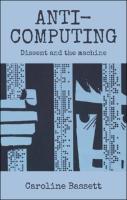Anti-computing
Dissent and the machine
Author(s)
Bassett, Caroline
Collection
Knowledge Unlatched (KU)Language
EnglishAbstract
Anti-computing explores forgotten histories and contemporary forms of dissent – moments when the imposition of computational technologies, logics, techniques, imaginaries, utopias have been questioned, disputed, or refused. It also asks why these moments tend to be forgotten. What is it about computational capitalism that means we live so much in the present? What has this to do with computational logics and practices themselves? <br />This book addresses these issues through a critical engagement with media archaeology and medium theory and by way of a series of original studies; exploring Hannah Arendt and early automation anxiety, witnessing and the database, Two Cultures from the inside out, bot fear, singularity and/as science fiction. Finally, it returns to remap long-standing concerns against new forms of dissent, hostility, and automation anxiety, producing a distant reading of contemporary hostility.<br />At once an acute response to urgent concerns around toxic digital cultures, an accounting with media archaeology as a mode of medium theory, and a series of original and methodologically fluid case studies, this book crosses an interdisciplinary research field including cultural studies, media studies, medium studies, critical theory, literary and science fiction studies, media archaeology, medium theory, cultural history, technology history.
Keywords
anti-computing; dissent; media archaeology; medium theory; Hannah Arendt; automation anxiety; science fiction; digital cultures; interdisciplinary researchISBN
9780719083785, 9781526160720Publisher
Manchester University PressPublisher website
https://manchesteruniversitypress.co.uk/Publication date and place
Manchester, 2021Grantor
Classification
Literary studies: ancient, classical and medieval
Literary studies: poetry and poets
Literary studies: general


 Download
Download Web Shop
Web Shop